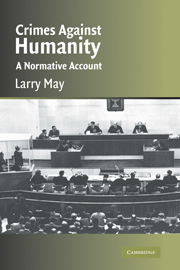Book contents
- Frontmatter
- Contents
- Acknowledgments
- A UNIVERSAL NORMS AND MORAL MINIMALISM
- B PRINCIPLES OF INTERNATIONAL CRIMINAL LAW
- 4 The Security Principle
- 5 The International Harm Principle
- 6 International Crime: The Case of Rape
- C PROSECUTING INTERNATIONAL CRIMES
- D DEFENSES AND ALTERNATIVES
- Conclusions
- Notes
- Bibliography
- Index
5 - The International Harm Principle
Published online by Cambridge University Press: 23 November 2009
- Frontmatter
- Contents
- Acknowledgments
- A UNIVERSAL NORMS AND MORAL MINIMALISM
- B PRINCIPLES OF INTERNATIONAL CRIMINAL LAW
- 4 The Security Principle
- 5 The International Harm Principle
- 6 International Crime: The Case of Rape
- C PROSECUTING INTERNATIONAL CRIMES
- D DEFENSES AND ALTERNATIVES
- Conclusions
- Notes
- Bibliography
- Index
Summary
In this chapter, I focus on the normative justification of international criminal tribunals, especially those that prosecute crimes against humanity or genocide. Because of that focus, I am especially interested in determining the limits of international law that might themselves be based on considerations of justice or human rights. I am interested in investigating what sorts of norms, once violated, warrant international criminal tribunals to prosecute a State's leader or a subject of a State that participated in serious human rights abuses, especially where the abuse was directed at fellow subjects of that State. These are especially tough issues because what is at stake in international prosecutions is the restriction of liberty of the accused, which itself risks violations of justice or human rights. To offset the possible injustice done to defendants by incarceration, there must be a correspondingly important injustice to the international community that is being prosecuted, and ultimately redressed. International criminal trials that risk the loss of a defendant's liberty require a special form of justification.
The security principle opens the door for such things as international tribunals by countering the claim of abridged sovereignty by a particular State whose subjects would be the defendants in an international trial. Another principle, the international harm principle, is needed to counter the claim made in behalf of the defendant that his or her liberty is jeopardized by such an international trial.
- Type
- Chapter
- Information
- Crimes against HumanityA Normative Account, pp. 80 - 95Publisher: Cambridge University PressPrint publication year: 2004

